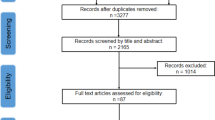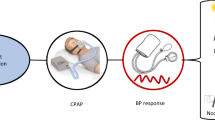Abstract
Purpose of Review
The significant prevalence of resistant hypertension (RH) and the high cardiovascular risk of the population of patients with RH have indicated the necessity to identify its main causes. Among these, obstructive sleep apnea (OSA) is considered the most well-established cause.
Recent Findings
In recent years, several studies have shown a beneficial effect of continuous positive airway pressure (CPAP) treatment on blood pressure (BP), but this effect exhibits great variability. The diagnosis and management of OSA in patients with RH suggest a clinical option for a phenotype of patients for whom therapeutic strategies are limited to pharmaceutical therapy and renal denervation. However, the great variability in the CPAP response has increased the necessity to develop instruments to identify patients who could benefit from a treatment that reduces BP.
Summary
Application of precision medicine to these patients should be considered as a first-line intervention to avoid the prescription of ineffective treatments and excessive consumption of pharmacological drugs that do not ameliorate the cardiovascular risk.

Similar content being viewed by others
References
Papers of particular interest, published recently, have been highlighted as: •• Of major importance
Collins Francis SHHA. New initiative on precision medicine. N Engl J Med. 2015;372(9):793–5.
Sánchez-de-la-torre M, Gozal D. Obstructive sleep apnea: in search of precision. Expert Rev Precis Med Drug Dev. 2017;0(0):1–12.
Mills KT, Bundy JD, Kelly TN, Reed JE, Kearney PM, Reynolds K, et al. Global disparities of hypertension prevalence and control: a systematic analysis of population-based studies from 90 countries editorial. Circulation. 2016;134:441–50.
Lawes CM, Vander Hoorn S, Rodgers A, et al. Global burden of blood-pressure-related disease. Lancet. 2008;371(9623):1513–8.
Group EPF, Europe PMC, Funders Group. Global, regional, and national comparative risk assessment of 79 behavioural, environmental and occupational and metabolic risks or clusters of risks in 188 countries, 1990–2013: a systematic analysis for the Global Burden of Disease Study. Lancet. 2015;386(10010):2287–323.
Padmanabhan S. Precision medicine in Hypertension 2016; 35–8.
Calhoun DA, Jones D, Textor S, et al. Resistant hypertension: diagnosis, evaluation, and treatment a scientific statement from the American Heart Association Professional Education Committee of the Council for High Blood Pressure Research. Circulation. 2008;117(25):510–26.
NICE. National Institute for Health Care Excellence. Hypertension in adults: diagnosis and management. 2017.
Persu A, Brien E, Verdecchia P. Use of ambulatory blood pressure measurement in the definition of resistant hypertension: a review of the evidence. Hypertens Res. 2014;37(11):967–72.
Brien EO, Parati G, Stergiou G, et al. European Society of Hypertension position paper on ambulatory blood pressure monitoring. J Hypertens. 2013;31(9):1731–68.
Kumbhani DJ, Steg PG, Cannon CP, Eagle KA, Smith SC Jr, Crowley K, Goto S, Ohman EM, Bakris GL, Perlstein TS, Kinlay S, Bhatt DL, REACH Registry Investigators. Resistant hypertension: a frequent and ominous finding among hypertensive patients with atherothrombosis. Eur Heart J 2013;34(16):1204–1214.
Pierdomenico SD, Lapenna D, Bucci A, di Tommaso R, di Mascio R, Manente BM, et al. Cardiovascular outcome in treated hypertensive patients with responder, masked, false resistant, and true resistant hypertension. AJH. 2005;18:1422–8.
Epidemiology PSD. Population studies prevalence of resistant hypertension in the United States, 2003–2008. Hypertension. 2011;57:1076–80.
Egan BM, Zhao Y, Axon RN, Brzezinski WA. Uncontrolled and apparent treatment resistant hypertension in the U.S. 1988-2008. Circulation. 2012;124(9):1046–58.
De La Sierra A, Segura J, Banegas JR, et al. Clinical features of 8295 patients with resistant hypertension classified on the basis of ambulatory blood pressure monitoring. Hypertension. 2011;57(5):898–902.
Gijón-Conde T, Graciani A, Banegas JR. Resistant hypertension: demography and clinical characteristics in 6292 patients in a primary health care setting. Rev Esp Cardiol. 2014;67(4):270–6.
Salles GF, Cardoso CRME. Prognostic influence of office and ambulatory blood pressures in resistant hypertension. Arch Intern Med. 2016;168(21):2340–6.
Tsioufis C, Kasaiakogias A, Kordalis A, et al. Dynamic resistant hypertension patterns as predictors of cardiovascular morbidity: a 4-year prospective study. J Hypertens. 2014;32(2):415–22.
Daugherty SL, Powers JD, Magid DJ, Tavel HM, Masoudi FA, Margolis KL, et al. Incidence and prognosis of resistant hypertension in hypertensive patients. Circulation. 2012;125:1635–42.
Gonzaga C, Bertolami A, Bertolami M, Amodeo C, Calhoun D. Obstructive sleep apnea, hypertension and cardiovascular diseases. J Hum Hypertens Adv. 2015;12:1–8.
Sánchez-de-la-Torre M, Campos-Rodriguez F, Barbé F. Obstructive sleep apnoea and cardiovascular disease. Lancet Respir Med. 2013;1(1):61–72.
Lévy P, Kohler M, McNicholas WT, et al. Obstructive sleep apnoea syndrome. Nat Rev Dis Prim. 2015;25(1):15015.
Peppard PE, Young T, Barnet JH, Palta M, Hagen EW, Hla KM. Original contribution increased prevalence of sleep-disordered breathing in adults. Am J Epidemiol. 2013;177(9):1006–14.
Torres G, Sánchez-De-La-Torre M, Barbé F. Relationship between OSA and hypertension. Chest. 2015;148(3):824–32.
Cai A, Wang L, Zhou Y. Hypertension and obstructive sleep apnea. Hypertens Res. 2016;39(6):391–5.
Barbe F, Marı JM, Garcia-rio F, et al. Long-term effect of continuous positive airway pressure in hypertensive patients with sleep apnea. Am J Respir Crit Care Med. 2010;181(7):718–26.
•• Martínez-García M-A, Capote F, Campos-Rodríguez F, et al. Effect of CPAP on blood pressure in patients with obstructive sleep apnea and resistant hypertension The HIPARCO Randomized Clinical Trial. JAMA. 2013;310:2407–15. In this randomized controlled trial, the authors demonstrated that CPAP treatment significantly decrease blood pressure in patients with resistant hypertension and obstructive sleep apnea
•• Marin JM, Carrizo SJ, Vicente E, et al. Long-term cardiovascular outcomes in men with obstructive sleep apnoea-hypopnoea with or without treatment with continuous positive airway pressure: an observational study. Lancet. 2005;365:1046–53. In this observational study, the authors showed that severe obstructive sleep apnea-hypopnoea significantly increases the risk of fatal and non-fatal cardiovascular events. CPAP treatment reduces this risk
•• Barbe F, Durán-Cantolla J, Sanchez-de-la-Torre M, et al. Effect of continuous positive airway pressure on the incidence of hypertension and cardiovascular events in non sleepy patients with obstructive sleep apnea. JAMA. 2012;307(20):2161–8. The results of this randomized controlled trial highlight the importance of the compliance with CPAP to achieve the possible benefits in cardiovascular risk reduction in OSA patients for primary prevention
Bazzano LA, Khan Z, Reynolds K, He J. Effect of nocturnal nasal continuous positive airway pressure on blood pressure in obstructive sleep apnea. Hypertension. 2007;50(2):417–23.
Pedrosa RP, Drager LF, Gonzaga CC, Sousa MG, de Paula LKG, Amaro ACS, et al. Obstructive sleep apnea: the most common secondary cause of hypertension associated with resistant hypertension. Hypertension. 2011;58:811–7.
Gonçalves SC, Martinez D, Gus M, de Abreu-Silva EO, Bertoluci C, Dutra I, et al. Obstructive sleep apnea and resistant hypertension: a case-control study. Chest. 2007;132(6):1858–62.
Liu L, Cao Q, Guo Z, Dai Q. Continuous positive airway pressure in patients with obstructive sleep apnea and resistant hypertension : a Meta-analysis of randomized controlled trials. J Clin Hypertens (Greenwich). 2016;18(2):153–8.
Logan AG, Perlikowski SM, Mente A, Tisler A, Tkacova R, Niroumand M, et al. High prevalence of unrecognized sleep apnoea in drug-resistant hypertension. J Hypertens. 2001;19(12):2271–7.
Silverberg DS, Oksenberg A. Are sleep-related breathing disorders important contributing factors to the production of essential hypertension? Curr Hypertens Rep. 2001;3:209–15.
Williams B, Macdonald TM, Morant S, et al. Spironolactone versus placebo, bisoprolol , and doxazosin to determine the optimal treatment for drug-resistant hypertension ( PATHWAY-2 ): a randomised, double-blind, crossover trial. Lancet. 2015;386(10008):2059–68.
Engbaek M, Hjerrild M, Hallas J. The effect of low-dose spironolactone on resistant hypertension. J Am Soc Hypertens. 2010;4(6):290–4.
Václavík J, Sedlak R, PlachyM, et al. Addition of spironolactone in patients with resistant arterial hypertension (ASPIRANT): a randomized, double-blind, placebo-controlled trial. Hypertension. 2011;57(6):1069–75.
Parthasarathy HK, Alhashmi K, Mcmahon AD, et al. Does the ratio of serum aldosterone to plasma renin activity predict the efficacy of diuretics in hypertension? Results of RENALDO. J Hypertens. 2010;28(1):170–7.
Bhatt DL, Kandzari DE, O'Neill WW, D'Agostino R, Flack JM, Katzen BT, Leon MB, Liu M, Mauri L, Negoita M, Cohen SA, Oparil S, Rocha-Singh K, Townsend RR, Bakris GL, SYMPLICITY HTN-3 Investigators. A controlled trial of renal denervation for resistant hypertension. N Engl J Med 2014;370(15):1393–1401.
Elmula F, Fadl M, Hoffmann P, et al. Renal denervation renal sympathetic denervation in patients with treatment-resistant hypertension after witnessed intake of medication before qualifying ambulatory blood pressure. Hypertension. 2013;62(3):526–32.
•• Pedrosa RP, Drager LF, De Paula LKG, et al. Effects of OSA treatment on BP in patients with resistant hypertension: a randomized trial. Chest. 2013;144:1487–94. In this randomized controlled trials, the authors reported that CPAP treatment significantly reduces daytime BP in patients with resistant HTN and OSA
Lozano L, Tovar JL, Sampol G, Romero O, Jurado MJ, Segarra A, et al. Continuous positive airway pressure treatment in sleep apnea patients with resistant hypertension: a randomized, controlled trial. J Hypertens Wolters Kluwer Heal J Hypertens. 2010;28(10):2161–8.
Litvin AY, Sukmarova ZN, Elfimova EM, Aksenova AV, Galitsin PV, Rogoza AN, et al. Effects of CPAP on “vascular” risk factors in patients with obstructive sleep apnea and arterial hypertension. Vasc Health Risk Manag. 2013;9:229–35.
Muxfeldt ES, Margallo V, Costa LMS, Guimaraes G, Cavalcante AH, Azevedo JCM, et al. Effects of continuous positive airway pressure treatment on clinic and ambulatory blood pressures in patients with obstructive sleep apnea and resistant hypertension. Hypertension. 2015;65(4):736–42.
Iftikhar IH, Valentine CW, Bittencourt LRA, Cohen DL, Fedson AC, Gíslason T, et al. Effects of continuous positive airway pressure on blood pressure in patients with resistant hypertension and obstructive sleep apnea: a meta-analysis. J Hypertens. 2014;32(12):2341–50.
Montesi SB, Edwards BA, Malhotra A, Bakker JP. The effect of continuous positive airway pressure treatment on blood pressure: a systematic review and meta-analysis of randomized controlled trials. J Clin Sleep Med. 2012;8(5):587–96.
•• Sánchez-de-la-Torre M, Khalyfa A, Sánchez-De-La-Torre A, et al. Precision medicine in patients with resistant hypertension and obstructive sleep apnea blood pressure response to continuous positive airway pressure treatment. J Am Coll Cardiol. 2015;66(9):1023–1032. In this study, the authors described the first personalized medicine tool to predict blood pressure response to CPAP treatment in patients with resistant hypertension and OSA.
Sapiña-Beltrán E, Torres G, Martínez-Alonso M, et al. Rationale and methodology of the SARAH trial: long-term cardiovascular outcomes in patients with resistant hypertension and obstructive sleep apnea. Arch Bronconeumol. 2018.
Lloberes P, Espinel E, Segarra A, et al. A randomized controlled study of CPAP effect on plasma aldosterone concentration in patients with resistant hypertension and obstructive sleep apnea. J Hypertens. 2014;32(8):1650–7.
de Oliveira AC, Martinez D, Massierer D, et al. The antihypertensive effect of positive airway pressure on resistant hypertension of patients with obstructive sleep apnea: a randomized, double-blind, clinical trial. Am J Respir Crit Care Med. 2014;190(3):345–7.
Lei Q, Lv Y, Li K, Ma L, Du G, Xiang Y, et al. Effects of continuous positive airway pressure on blood pressure in patients with resistant hypertension and obstructive sleep apnea: a systematic review and meta-analysis of six randomized controlled trials. J Bras Pneumol. 2017;43(5):373–9.
Funding
Supported by the following: Fondo de Investigación Sanitaria (Fondo Europeo de Desarrollo Regional (FEDER) (PI14/01266; PI16/00489; DTS15/00145)), the Spanish Respiratory Society (SEPAR), Young Researchers Award from the AstraZeneca Foundation, and ALLER.
Author information
Authors and Affiliations
Corresponding author
Ethics declarations
Conflict of Interest
The authors declare no conflict of interest relevant to this manuscript.
Human and Animal Rights and Informed Consent
This article does not contain any studies with human or animal subjects performed by any of the authors.
Additional information
This article is part of the Topical Collection on Resistant Hypertension
Rights and permissions
About this article
Cite this article
Sapiña, E., Torres, G., Barbé, F. et al. The Use of Precision Medicine to Manage Obstructive Sleep Apnea Treatment in Patients with Resistant Hypertension: Current Evidence and Future Directions. Curr Hypertens Rep 20, 60 (2018). https://doi.org/10.1007/s11906-018-0853-3
Published:
DOI: https://doi.org/10.1007/s11906-018-0853-3




